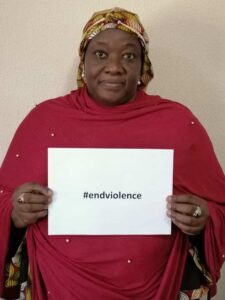International Day of Zero Tolerance for Female Genital Mutilation: Obstetric Fistula and Female Cutting in Sokoto – A Preventable Scourge
By Aisha Ahmed, WI-HER, Gender, Social Inclusion and Community Engagement Advisor for USAID IHP in Sokoto State, Nigeria
“A young girl had an obstetric fistula at a young age. She was married and pregnant. Unfortunately, the girl was living with her mother in-law because her husband had travelled to make ends meet in another State. Her mother in-law did not give permission for her to be taken to the hospital when she was in labor. The girl spent three days in labor and was later put to bed. After some days she began leaking and even lost the baby. She smelled of urine every day, and as a result was divorced by her husband and left in a pathetic state.” – Hajiya Asabe, Family Planning Focal Person of the Sokoto State Primary Health Care Development Agency (SSPHCDA)

The above story is sadly not a rarity in Sokoto, but an all too true reality for hundreds of girls and women in the State. The complications of obstetric fistula, both physical and psychosocial, are debilitating to women. The uncontrollable leaking of urine or feces gives women an unpleasant odor, and they can experience ostracism from their family and friends. This ostracization can lead to divorce or separation, depression, or exclusion from social activities, which can in turn affect the woman’s financial outcomes if her condition is a cause of her unemployment.
Globally, each year 50,000 to 100,000 women sustain an obstetric fistula in the act of trying to bring forth new life. It is the most devastating of all pregnancy-related disabilities, and Nigeria accounts for 40% of fistula cases worldwide. It is not surprising then that Nigeria also has the world’s heaviest burden of obstetric fistula, according to USAID.
Nigeria also has the highest number of female genital mutilation (FGM) worldwide, accounting for about one-quarter of the estimated 115 to 130 million circumcised women in the world. Female genital cutting is rarely discussed in the open, but for women in Nigeria female cutting is devastating. The World Health Organization reports that one in four Nigerian women between the ages of 15 and 49 years has experienced FGM.
FGM, and female cutting (FGM/C), are recognized worldwide as fundamental violations of the human rights of girls and women. It reflects deep-rooted inequality between the sexes and constitutes an extreme form of discrimination against women. For example, Gishiri or Yankan Gishiri, otherwise known as ‘Salt’ Cutting, is one type of female cutting that physicians and women’s rights advocates in Kebbi State have been working to address. This tradition, practiced by some Hausa and Fulani populations, involves inserting a knife to widen the vagina under the belief that it will cure a variety of gynecological ailments, including pain during sex. The history of this practice dates back to salt cuts that originally referred to a sample slice of salt sheared off a salt block with a sharp knife, cut by Saharan traders to offer buyers a taste. Despite its egregious violation to the dignity of women, this practice carries with it risk of fistula as well as other physical and emotional harm.
Factors that contribute to Salt Cutting, FGM/C, and fistula are all related to women’s lack of empowerment, including:
- Ingrained harmful social and cultural practices that keep women from health and social services, which put them further at risk; and
- Inadequate education – particularly among females – keeps these populations unaware of the devastating consequences. For example, with female literacy rates below 50% in Nigeria, survivors of FGM/C and women with fistula face many obstacles in learning about how to prevent these conditions and access treatment.
However, there is a ray of hope, as these conditions are largely preventable and treatable. Since 2004, USAID, in collaboration with global and local partners, has provided support for interventions to improve fistula and FGM/C services and address this nightmare in sub-Saharan Africa and South Asia through three global projects: ACQUIRE Project (2004-2007), Fistula Care Project (2007-2013), and Fistula Care Plus (2013-2021). Through this investment, USAID supported more than 54,000 fistula repairs, provided more than 1.5 million family planning counseling sessions, improved 100 health facilities, and trained thousands of medical personnel and volunteers, including more than 300 surgeons, in fistula repair across many countries. In 2017, Nigeria’s Ministry of Health mandated free fistula repair surgeries nationwide and waived associated laboratory fees for all clients at tertiary hospitals. Through these efforts and others, there is evidence of significant generational change in the prevalence of FGM/C in Nigeria as women aged 45-49 are more than twice as likely to have been cut compared to girls aged 15-19.
These topics are difficult to talk about. They make us feel uncomfortable. But we must bring these harmful practices out in the open so we can learn about how dangerous they are. Then, we can establish protections for women that defend their human rights against physical and emotional torture.
Opening dialogue, raising awareness, and educating both women and men will help us stop the cutting and mutilation of women and girls. We can help lower their vulnerability and risk by empowering women and girls with access to schools and economic improvement, as well as allowing them to have an equal voice in their communities. I currently advocate for women and girls through a USAID project in Nigeria called the Integrated Health Program (IHP). I educate women and men, State decision makers, local health providers, and others to raise awareness and achieve actionable commitment to the protection of women’s rights and safety. I believe it is possible to make a significant impact in the maternal morbidity and mortality rates in Sokoto and Nigeria as a whole, and restore the health and dignity of women who suffer from these practices. Through IHP, female cutting is something we can stop – so why wait?